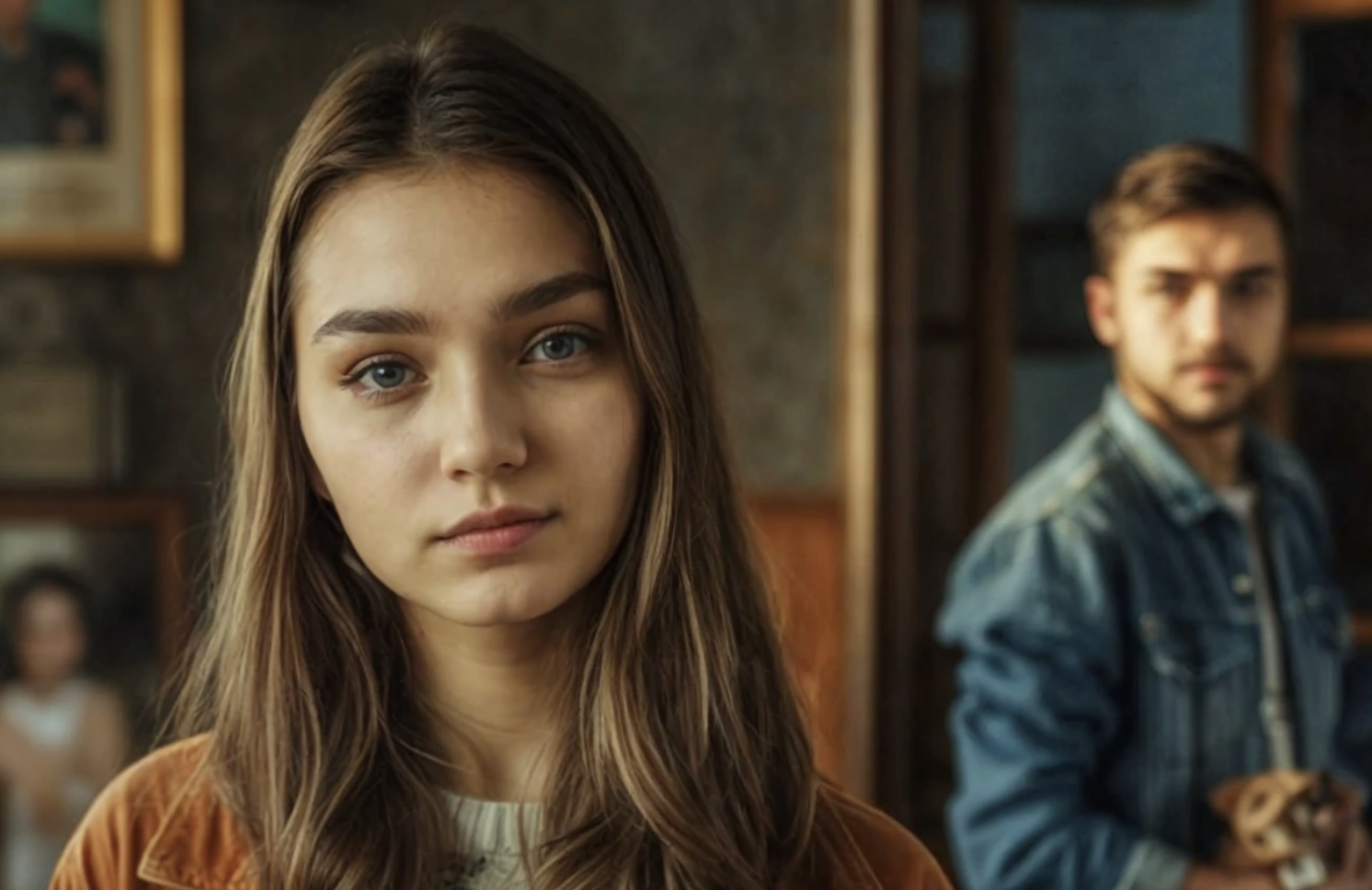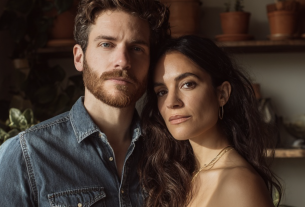Friends and colleagues condemned me, calling my actions abnormal, but I don’t care. To me, those who mistreat animals aren’t even human. How can one betray one’s friends? And a dog—my beloved Plushka—is my dearest friend, and I would never trade her for anyone.
Plushka is a beautiful, reddish Spitz whom my mother adored. She would rush around with Plushka like a little child, and my father was always charmed by it. He, too, loved Plushka: he would take her for walks, play with her, and constantly snap photos. She was the family darling. And when my mother passed away, I took Plushka in.
It was hard for all of us back then—we missed our mother terribly. I don’t even know what I would have done without Plushka, how I would have managed. With Plushka, I had to go out for walks constantly; otherwise, I would have curled up in bed like a ball and not gotten up at all. I had no strength for anything, but I squeezed every bit of energy out of myself—after all, a dog needs care, and my mother would have wanted that. My father and I gradually drifted apart and grieved separately, each in our own way.
Over time, things became easier; I managed to move on with my life and even began to explore new possibilities. On one of those days, I met Danya. I was out walking with old Plushka while he was jogging. It was a cool evening, the fog had thickened—and then he appeared.
“I see you here often,” said Danya. “I just never had the nerve to come over and introduce myself. May I ask your name?”
“Katya,” I replied. “And this is Plushka.”
Danya patted the dog—apparently out of courtesy—and then turned back to me. As it later turned out, he was indifferent to animals, but that didn’t bother me. I understood that not everyone is obliged to love dogs. Some people prefer cats, others reptiles, and some have entirely different interests in life. It was enough for me that he treated Plushka attentively: he never mistreated her, he played with her a bit, and he would walk her whenever I asked.
We quickly got together—moving into my rented apartment, which we could later buy. I needed someone with whom I could talk, someone to whom I could give the warmth, care, and love that had been preserved through years of grief. And it seemed that Danya came into my life at just the right time—right when I had stopped shutting myself off and was ready for new relationships.
Soon, Danya proposed to me, but for some reason I hesitated. And my father said,
“Marriage isn’t slavery, Katya. If it doesn’t work out, you’ll separate. But if it does, you’ll live long and happily. Life is short and unpredictable, as you know.”
“But what if it doesn’t work?” I asked. I was terrified of taking such a step, even though my father was right—I wasn’t selling myself into slavery and could leave at any moment.
“It will be a valuable experience. How else are you supposed to live if you don’t take risks and try?”
After some thought, I finally agreed to marry Danya. I’m still very grateful to my father for those words. Even though we didn’t end up living “long and happily,” I truly gained valuable experience and learned which kinds of people should not be chosen as life partners. At the same time, I weeded out from my life everyone who had condemned me.
Our wedding was small but joyful. My father, Danya’s mother, a few relatives, and a couple of friends were there. We were given so much money that we decided not to delay and buy our rented apartment outright. My father contributed most of the sum, and we also borrowed a little from the bank—which we repaid rather quickly.
Danya and I lived well together: we immediately found common ground in daily life, easily divided responsibilities, and quickly set up our household budget system. I found it so easy with him. When needed, Danya took responsibility, and in other cases he yielded to me. There was never a moment when he pounded his fist on his chest shouting, “I’m a man, and it’ll be the way I say!” or, on the contrary, when he would shrink away like a spineless wimp muttering in the corner.
Everything went awry when my mother-in-law, Ksenia Fyodorovna, started coming to visit.
When Danya and I were merely cohabiting, she didn’t interfere much. Perhaps she thought our relationship wouldn’t last long, or maybe she didn’t want to scare us—I’m not sure. Or perhaps she didn’t like that we lived in a rented apartment—a place that wasn’t really ours. But as soon as we bought the apartment, she felt like its mistress: she began coming over without asking, rearranging things, and even demanded a duplicate set of keys.
“No,” I said, “no duplicate keys.”
“But your father has one,” remarked Danya. “It’s not fair.”
“My father doesn’t come to visit us as if it were his own home,” I replied, “and he always gives at least a week’s notice. And your mother seems to have lost track of proper boundaries. We have our own family, Danya, and I never agreed to share our living space with your mother.”
We had a huge argument then—the first since we met. But I did not relent, and Ksenia Fyodorovna did not receive the keys.
I didn’t want to give her the keys not only because of her intrusiveness, but also because of her attitude toward Plushka. While Danya simply didn’t care about animals—whether they were there or not made no difference—Ksenia Fyodorovna outright hated them. Especially dogs.
“Animals should live outside,” she declared every time Plushka dashed into the corridor to greet her. “Far from people. They’re dirty.”
“My dog is cleaner than you,” I would retort, without a care for accidentally offending Ksenia Fyodorovna. I would never have spoken to her in that tone, but since she felt entitled to come uninvited and insult my dog, why should I hold back?
“Just get rid of her—and that’s that,” she once declared.
“She’s the memory of my mother,” I said. “And if I hear one more bad word about my dog, I won’t get rid of her—I’ll get rid of you. And I’ll forbid Danya from letting you in.”
In those moments, I deeply missed my mother. I didn’t know how I should behave. Was I overdoing it by defending Plushka so passionately? Or maybe I needed to be more cunning and find a way to approach my mother-in-law? But then again, she was a stranger to me—why should I try to find common ground when she wasn’t even making an effort toward me?
“Your mother-in-law and father-in-law got along right away,” said my father when I complained about Ksenia Fyodorovna’s appalling behavior. “I think you shouldn’t let her into your home if your relationship isn’t working out. I understand, dear, but then let Danya visit her himself instead of making you endure it all.”
I agreed with my father and repeatedly asked Danya to stop indulging his insolent mother.
“We weren’t even fighting before she started meddling in our relationship,” I stated during yet another conversation. “And now we’re having arguments every other day. I can’t stand it. I didn’t get married to live on a powder keg and endure an unpleasant person in my own home.”
“You’re just upset because I have a mother and you don’t,” Danya snapped then.
Those words hurt me terribly—to the extent that for a week I couldn’t bring myself to speak to him, let alone hug or kiss him. He knew me so well; we had lived so wonderfully together. So why would he say such awful things to me? It was as if he had no empathy at all.
“I’m sorry, dear,” he apologized all week. “I don’t even know what came over me. I shouldn’t have said that. It’s just unpleasant that you’re against my mother, and I lashed out in anger…”
“I’m not against her for no reason,” I replied once I had more or less regained my composure and let go of my hurt. “She comes uninvited, tries to impose her rules in our apartment, and insults my dog. This is abnormal, Danya. Are we a family or what? Keep your mother at a distance, and I’ll treat her nicely. Dealing with your mother is your responsibility, not mine. If my father were bothering you, I wouldn’t wait for you to sort it out—I’d speak to him myself.”
“That’s just wrong,” Danya replied. “Men should sort things out with men, and women with women. Why should I meddle?”
That was the first time he mentioned stereotypes. I immediately tensed up.
“I don’t owe you anything, Danya. If you want a peaceful life, work to make it happen. Right now, the only thing standing in our way is your mother.”
Plushka would get distressed whenever we fought: she’d start running around and getting underfoot—just like a cat. I’d be distracted by her and calm down, while Danya stuck to his opinions.
It was all so sad. I felt our marriage was coming apart at the seams, and my own powerlessness made me want to howl. What could I do? Go out of my way to please Ksenia Fyodorovna? I could have apologized for my rudeness, but that rudeness was merely a reaction to her actions.
“Why do you keep coming to our place? Are you trying to charm us with your sweetness or something? There’s no place for you here,” I asked, seeing her at the doorway once again.
“I come for my son, not for you,” she replied haughtily.
“Then don’t snoop around my closets—keep your nose out of there.”
Yes, I was rude, but I was utterly tired of her. I worked a lot, went out walking and caring for my dog, did my share of the housework—and instead of rest and relaxation, I was subjected to nerve-wracking encounters in the form of my mother-in-law, who loudly complained about how much Plushka annoyed her. Well, if a dog bothers you, then don’t come into the apartment where she lives—what’s the problem?
“How much fur from your mutt,” she grumbled, picking non-existent hairs from her food.
“That’s your hair that fell in there,” I retorted. “See? It’s the same color as yours.”
I admit, I’m not exactly a delight with my temper either. But all I needed was the opportunity to live peacefully in my own apartment. Without uninvited guests, without arguments, without a long nose that constantly tries to poke into my dresser to rummage through my tights or into my kitchen cabinet to rearrange all the mugs.
Perhaps I would have endured this unhealthy confrontation for much longer if Ksenia Fyodorovna hadn’t crossed the line.
Returning from work, I expected Plushka to burst out from around the corner and start dancing around me. Instead, I was met with silence; only the sound of running water from the kitchen indicated that Danya was washing the dishes.
“Danya,” I called as I peeked into the kitchen. “Where’s Plushka?”
“My mother came over today…” he began, but I interrupted him.
“I’m glad she came by. But where is my dog?”
“Your dog—I’ve given her to good hands. My mother said that animals have no place in the house,” declared my husband.
“You did… what?”
My voice instantly died down, and I could barely get the words out. Before I could even process what he had said, tears began to stream down—hot, acrid, angry. In a rage, I jumped at Danya, clutched his T-shirt, and started yelling at him. I probably looked awful at that moment because he just stared at me with wide eyes.
“Immediately bring me back my dog!” I shouted. “Where did you stash her? Answer me!”
“Katya, calm down…” he tried to free my hands. “It’s just a dog. There’s no place for animals in an apartment… and she irritates my mother. Besides, I didn’t really like her.”
“And your mother irritates me! And I don’t like you very much anymore either! How about we give your mother over to good hands?!” I screamed.
“You’ll come up with something…” he replied.
“Danya, I’m not joking.” He continued pulling at my wrists, but I clung to him like a tick. “Either you immediately tell me where you put my dog, or I’ll file a theft report against your mother. And let the police deal with her. Do you really want your mother to have that kind of life?”
“Alright, Katya, let me go! Here’s the number, call…”
Not allowing Danya to finish, I snatched the phone from his back pocket. He showed me the number I needed, and I dashed into the next room—to call the people to whom Danya had passed off my dog.
At first, they were reluctant to return Plushka, but after hearing my sobs and incoherent explanations, they promised to bring her back tomorrow. I wanted to go get her right away, but they tried to calm me down:
“Don’t worry, we won’t harm your Plushka. It’s too late now, but tomorrow we’ll bring her to you ourselves. However, we won’t refuse a chocolate bar as compensation for the trouble.”
Through my tears, I smiled and promised them the tastiest chocolate bar I could find.
“I’m sorry, Katya,” Danya said as I turned around to see him standing in the doorway, drying his hands with a towel. “I never thought you’d go into such a hysterical state… though there was reason for it.”
“You didn’t know?” I rasped. “It’s my mother’s dog. You knew everything. You knew how much I love her. You simply don’t care about me or my feelings. You have zero empathy.”
“Go ahead and give me more diagnoses,” he laughed. “You’ve been reading all sorts of stuff on the internet… right?”
I looked at him in disbelief. Did he really think I’d forgive this act? I’d been on edge for weeks, and now—this betrayal!
“What world are you talking about, Danya? I’m filing for divorce. I can’t live with you any longer. Your mother is already up my nose, and you’ve clearly shown your true feelings toward me. We’ll divide the apartment: since your contributions were smaller, I’ll pay you your share—that’ll be quicker. Or we could sell it and split the proceeds, I don’t know. I don’t care. And right now, either you pack your things and go to your mother’s, or I’ll pack mine and go to my father’s.”
“I’m not going anywhere,” Danya said calmly.
Shrugging my shoulders, I went to pack my things. Let him live there alone—it wouldn’t cost me a thing. In any case, the property would have to be divided in court later—and I’m sure his mother would have him fighting for every penny.
At work, everyone started asking why I’d left my husband, and when they found out, they shook their heads in disbelief. Many acquaintances even decided that I’d lost my mind—trading my husband for a dog. Let them think what they want. At least my Plushka is now with me, and I, awaiting divorce proceedings, am living with my father. It had been so long since we spent time together, so—perhaps it’s for the best.



